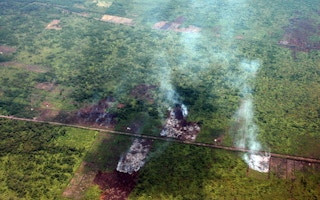As raging fires in Indonesia continue to fuel a thick haze across Southeast Asia, government officials are cracking down on plantation and forestry companies responsible for the fires, seemingly determined to make good on a recent pledge to end the burning in 30 days.
More than 200 plantation and forestry companies are now under investigation for their role in forest fires, said local government officials, as smoke from burning rainforests sent the Pollutant Standards Index (PSI) in Palangkaraya, Central Kalimantan, skyrocketing to 1995 - over six times more than what is considered hazardous - on Tuesday.
The PSI is a measurement of air quality.
The Straits Times also reported that four Indonesian companies were ordered to suspend operations for causing forest fires.
The companies named were: Tempirai Palm Resources and Waringin Agro Jaya, which operate in South Sumatra province, as well as Langgam Inti Hibrindo in Riau province. A Riau-based pulpwood firm Hutani Sola Lestari, also had to halt work.
Legal action has been taken against these firms. Bambang Hendroyono, Secretary-General of Indonesia’s environment ministry, said that “the suspensions will be in effect until the criminal proceedings undertaken by the police are finished”.
If found guilty, companies face hefty fines, prison terms for their senior management, and the loss of their operating licenses.
A Singapore-owned firm is also under investigation, said government officials, who declined to name the company.
The Indonesian government response to this year’s haze situation has included a swift investigation and high-profile arrests of company executives suspected to be burning forests, repeated apologies from top officials for the haze, and a promise by its environment minister Siti Nurbaya Bakar to hand over to Singapore the names of firms which were suspected to be responsible.
This sharply contrasts the government reaction to the haze crisis in 2013, when the PSI in Singapore hit a record high of 401. At the time, an Indonesian official accused Singapore of behaving “like a child” for demanding strong action from Jakarta, while another minister warned Malaysia and Singapore “not to tell stories to the world“.
Annisa Rahmawati, Indonesia forest campaigner, Greenpeace Southeast Asia, observed that the there have been more high-level government visits to the field this time, and more arrests than in previous years.
“Greenpeace welcomes the government’s newfound enthusiasm for law enforcement in cases of forest and peatland fires,” she said.
But “the government has a bad track record of following through with prosecutions, which often take years or stall entirely”, she cautioned.
In addition to the four firms suspended on Tuesday, also facing prosecution is PT Bumi Mekar Hijau, a plantation company that supplies pulpwood to paper products giant Asia Pulp & Paper (APP).
APP vs NGOs
“
Greenpeace welcomes the government’s newfound enthusiasm for law enforcement in cases of forest and peatland fires.
Annisa Rahmawati, forest campaigner, Greenpeace Southeast Asia
APP, which was last week identified by satellite forest monitoring platform Global Forest Watch (GFW) fires as the pulpwood company with the most fire alerts on its suppliers’ plantations, has denied culpability.
It says that most fires were started outside company concessions and spread inwards, and that “any fires started within concession are not authorised by us”.
However, a coalition of Indonesian green groups called Eyes on the Forest, refuted these claims on Thursday, citing satellite data analysis that showed hotspots being detected on a concession belonging to APP supplier PT Rimba Hutani as early as July this year.
“At least for this concession, the truth seems to be the other way around – fires spread from inside APP supplier’s concession to outside,” said the group.
Woro Supartinah, coordinator of Jikalahari, a member of the coalition, added that “APP continues to be unsuccessful to stop illegal logging of the forests they committed to protect”.
In response, Aida Greenbury, APP’s managing director for sustainability, told Eco-Business that “illegal loggers and forest encroachers are known to light fires to cook and clear land” on company-owned concessions.
Suppliers are trained to try and stop anyone caught burning land by using non-violent means, she said.
But suppliers also have no right to detain these individuals, “so the authorities need to provide their support by arresting them before fires become uncontrollable”, she added.
Greenpeace’s Rahmawati noted that while it is not always possible to determine who exactly is responsible for a fire, it is clear that concession holders are responsible for preventing and extinguishing fires on their land.
“They should also ensure they have good relations with local communities, which can include assisting with opportunities for sustainable livelihoods,” she added.
Greenbury added that the problem of illegal fires on concessions is further exacerbated by an Indonesian ruling, called Law 32, which allows communities to burn two hectares of land per family.
Indonesia’s Ministry for Environment and Forestry has acknowledged that these permitted blazes have often caused uncontrollable fires, she added.
Removing this law is a key part of tackling this issue, said Greenbury, and so are better law enforcement and the speedy completion of One Map, a government initiative to produce a comprehensive map of land use and concession boundaries in Indonesia.
“APP will continue to support the government in their investigations and will work with them to find a solution to forest fires,” she said.
But beyond this debate between green groups and companies, the systemic root of the problem is at the government level, said Rahmawati. Plantation concessions are still being granted licenses in fire-prone areas such as peatlands, which are exceptionally flammable and release huge volumes of carbon dioxide when burnt.
These licenses are often granted by district government heads without coordination with the central government, she added.
“Greenpeace believes fires will be dramatically reduced if all remaining forest and peatland areas are off limits for plantations,” said Rahmawati.

















